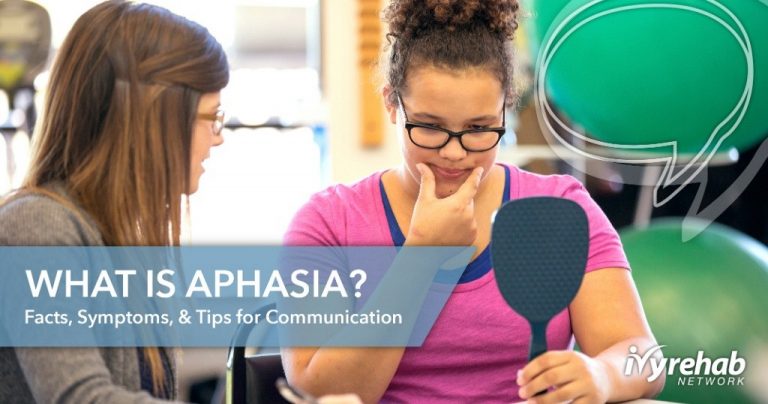
What is Aphasia? Facts, Symptoms, and Tips for Communication
River Steinberg, a speech therapy graduate student clinician from Ivy Rehab partner clinic, Southeastern Physical Therapy in Virginia Beach, VA, defines aphasia as well as facts, symptoms, and tips to help communicate:
What is Aphasia?
After a person has experienced a stroke, it is likely they may have some difficulty in everyday functioning afterward while healing. The stroke can produce a variety of consequences that come about during recovery such as muscle weakness, problems eating or swallowing, but also impairments with communication. When a person suffers from a stroke, or brain damage, and develops difficulties with the language it is called “aphasia”.
Signs and Symptoms
Aphasia can cause a variety of difficulties in communication including trouble talking, understanding, reading, or writing. Examples include:
- Can’t think of the words you want to say
- Saying the wrong word (ex. saying “fish” instead of “chicken”) or made-up words that don’t make sense
- Not understanding what others say, especially when speaking fast, using longer sentences, or talking in a group
- Have trouble reading forms, books, or computer screens
- Difficulty using numbers like counting money, adding/subtracting, or telling time
Statistics
According to a 2016 national survey on aphasia awareness, 84.1% of people can make the connection between stroke injury and difficulties with communication. Yet, 84.5% of people have NEVER heard of the term. More people have it than many other common conditions like Parkinson’s disease, cerebral palsy, multiple sclerosis. It occurs in 25-40% of stroke survivors and over 2,000,000 people in the United States struggle with it. This communication struggle has a greater negative impact on the quality of life than Alzheimer’s disease or cancer.
Tips to Improve Communication
- Talk in a quiet place and eliminate distractions (ex. turn off TV or radio)
- Keep eye contact and use gesture or facial expressions
- Use short, simple sentences with slower speech
- Ask yes or no questions
- Give time to respond, it might take a little longer than expected (do not try to finish sentences)
- Write down keywords or topics in large, bold print
Recovery and Treatment
While there is no “cure”, most people improve over time – especially if speech therapy is enacted within the first 6 months of onset. Yet, a person’s aphasia can still be treated even if onset occurred 10 or more years as long as they have access to appropriate intensive therapy! A licensed speech-language pathologist (SLP) can diagnose the condition and then work to develop a treatment plan that helps the person achieve personal goals such as having a conversation with family members, reading the newspaper, or returning to work.
We’re Here to Help
If you have suffered a stroke (or another type of brain injury) and find that you experience symptoms as described above, be sure that you or a caregiver speaks with a doctor, neurologist, or licensed SLP to schedule an appointment for further evaluation.
Sources:
http://www.asha.org/public/speech/disorders/Aphasia/
https://journals.lww.com/lww-medicalcare/Abstract/2010/04000/The_Relationship_of_60_Disease_Diagnoses_and_15.14.aspx
The medical information contained herein is provided as an information resource only, and does not substitute professional medical advice or consultation with healthcare professionals. This information is not intended to be patient education, does not create any patient-provider relationship, and should not be used as a substitute for professional diagnosis, treatment or medical advice. Please consult with your healthcare provider before making any healthcare decisions or for guidance about a specific medical condition. If you think you have a medical emergency, call your doctor or 911 immediately. IvyRehab Network, Inc. disclaims any and all responsibility, and shall have no liability, for any damages, loss, injury or liability whatsoever suffered as a result of your reliance on the information contained herein.